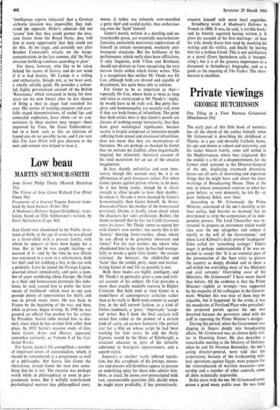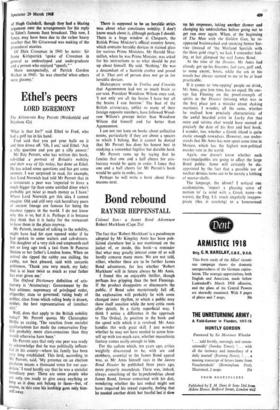Private viewings
GEORGE HUTCHINSON
The early part of this little book of memoirs has all the charm of the author himself, when Mr Grisewood is describing his childhood at Thame, in a gay and devoutly Catholic home, his ups and downs at school and university, and his rather bizarre family, some still settled in the Mediterranean, where they originated. But the middle is a bit of a disappointment, for the former chief assistant to the Director-General of the BBC, displaying overmuch discretion, leaves out all sorts of interesting and important things that he might have said about the inner workings of Broadcasting House. Then at the end, in almost sensational contrast to what has gone before, so very demurely, he lets fly—at poor Anthony Eden, over Suez.
According to Mr Grisewood, the Prime Minister, convinced of the BBC'S hostility to his Suez policy, had become so incensed that he determined to strip the corporation of its inde- pendent powers. The Lord Chancellor was in- structed 'to prepare an instrument which would take over the BBC altogether and subject it wholly to the will of the Government,' and when Lord Kilmuir's draft proved 'inadequate' Eden called for 'something stronger.' Eden's anger is perhaps understandable if he was ex- pected to accept that 'It is an essential part of the presentation of the Suez crisis to picture the country as deeply divided and to show a self-willed PM overriding most of his Ministers and civil servants.' Overriding most of his Ministers, Mr Grisewood? I have never heard that before. All the evidence is that the Prime Minister—rightly or wrongly--was supported by the majority of his colleagues in the Govern- ment. Whether this was wise of them may be arguable, but it happened. In the event, it was the mandarins of Portland Place who prevailed : the projected putsch against the BBC was thwarted because the governors sided with the staff in opposing the Prime Minister's designs.
During this period, when the Government was dipping its fingers deeply into broadcasting affairs, Mr Grisewood was an almost daily visi- tor to Downing Street. He also describes a remarkable meeting at the Ministry of Defence, when he and Sir Norman Bottomley, the BBC'S acting director-general, were told that the corporation, because of the forthcoming mili- tary operations against Egypt, must prepare for the reintroduction of wartime measures—cen- sorship and a number of other controls, some of them technically impossible. In his years With the BBC Mr Grisewood came across a good many public men. He was .fond of Hugh Gaitskell, though they had a blazing argument over the arrangements for his reply to Eden's famous Suez broadcast. This row, I fancy, may have been due to the rather heavy weather that Mr Grisewood was making of the procedural niceties.
Of Dick Crossman in 1941 he notes: Sir Ivone Kirkpatrick 'spoke of Crossman in general as undeveloped and undergraduate and a person who enjoyed "spoofs."' More unexpectedly, of Patrick Gordon Walker in 1945: 'he was cheerful when others were gloomy.'







































 Previous page
Previous page